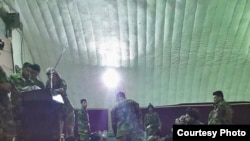A Taliban delegation arrived in Kabul Tuesday to monitor the long-delayed release of their 5,000 detainees under a prisoner swap with the Afghan government brokered by the United States.
This is the first time representatives of the Islamist insurgency have visited the Afghan capital since a U.S.-led military invasion of the country ousted the Taliban from power nearly 19 years ago.
“They will pursue the issue of prisoner release and help in necessary technical steps,” said a brief Taliban announcement.
Taliban delegates reportedly traveled from southern Kandahar province to a central Afghan city before being airlifted to Kabul by the International Committee of the Red Cross (ICRC).
The prisoner exchange, which requires the insurgent group to free about 1,000 government detainees, is supposed to lay the ground for peace negotiations between Afghan parties to the conflict.
The crucial peace-building steps are outlined in the February 29 agreement that Washington signed with the Taliban in Qatar, which aims to promote a negotiated end to years of a deadly Afghan war.
The pact commits the U.S. and allied nations to a 14-month phased withdrawal of military forces in exchange for Taliban assurances to prevent terrorists from using Afghanistan soil as a safe haven.
Afghan President Ashraf Ghani’s government, which is not part of the agreement, was initially reluctant to free captured Taliban fighters, citing concerns they may return to the battlefield. His refusal delayed the intra-Afghan talks that originally were scheduled for March 10 under the U.S.-Taliban accord.
Under pressure from Washington, Ghani last week announced a 21-member “inclusive” team of negotiators for the much-awaited intra-Afghan talks, a move that received praise from U.S. and other foreign partners of the war-ravaged country.
“We have seen a team identified and it looks like it’s pretty inclusive, pretty broad. We’re happy about that. We have begun to see some work done on prisoner releases as well,” Pompeo told reporters in Washington.
He emphasized that “all elements” will have to come together to move toward intra-Afghan negotiations, saying they are the only “mechanism” to deliver peace and reconciliation to the people of Afghanistan.
In a significant development Tuesday, Ghani’s main rival and self-proclaimed president, Abdullah Abdullah, also endorsed the negotiating team as representatives of “the Islamic State of Afghanistan.”
His announcement comes amid a lingering political dispute stemming from the September 28 controversy-marred Afghan presidential election, which Abdullah alleges was manipulated in favor of incumbent Ghani.
Both leaders sought competing inaugurations earlier this month, fueling political tensions and strengthening concerns their rivalry would prevent the formation of a united Afghan team to negotiate peace with the Taliban.
The insurgent group, however, has announced it would not negotiate with the government-appointed delegation, saying it does not represent all Afghans and contradicts provisions of the agreement with the U.S.
Speaking to VOA Tuesday, chief Taliban spokesperson Zabihullah Mujahid stressed again that intra-Afghan talks would begin only after all insurgent prisoners are freed. He went on to blame the Ghani government for "obstructing” and “delaying” the prisoner swap and the next steps in the peace process.
“The Kabul administration has also created, and continues to create, obstacles in the way to intra-Afghan talks. It has announced an unsuitable team and even declared it as a representative of the government,” Mujahid said.
The Taliban has from the outset rejected the government in Kabul as illegitimate, denouncing it as an American puppet and a product of foreign occupation of Afghanistan. The insurgent group maintains its negotiators want to negotiate peace with all Afghan sides in their individual capacity, and not as representatives of the government.




